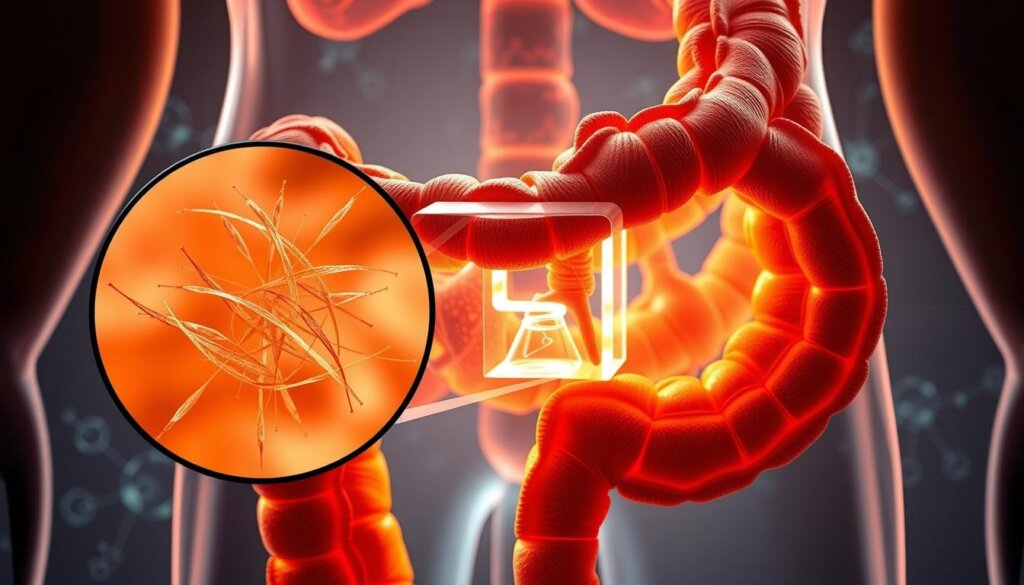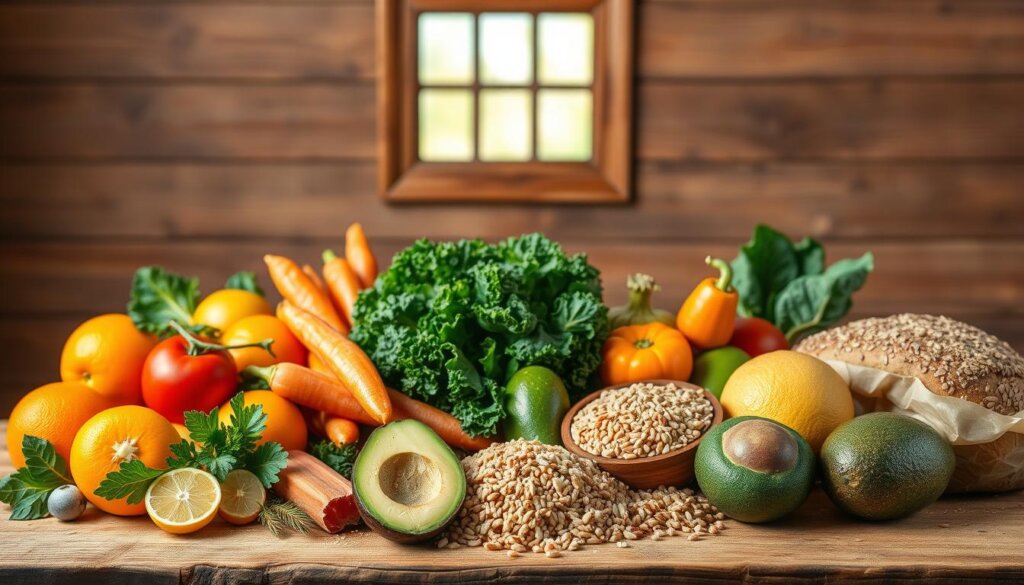Did you know 1 in 3 adults worldwide consumes less than half the daily recommended intake of a crucial nutrient linked to reduced disease risk? Research from UCLA Health and Memorial Sloan Kettering reveals this gap impacts long-term wellness more than most realize.
Colorectal health concerns are rising globally, particularly among younger populations. Yet fewer than 10% of individuals prioritize this vital dietary component. Wellness Group bridges this gap by translating medical findings into simple, actionable strategies.
This guide explores how specific food choices support bodily defenses, backed by clinical studies. Readers will discover:
- How different fiber types interact with digestion
- Practical meal adjustments backed by science
- Early-risk indicators everyone should monitor
Wellness Group’s specialists simplify complex research through personalized consultations. Reach them via WhatsApp at +60123822655 (Mon-Fri 9:30 AM–6:30 PM, Sat-Sun 10 AM–5 PM).
Key Takeaways
- Global fiber deficiency affects 90% of adults
- Early-onset colorectal issues increased 45% since 2000
- Plant-based diets reduce disease likelihood by 35%
- Whole grains and legumes offer optimal benefits
- Expert guidance improves sustainable habit formation
Understanding the Role of Fiber in Colon Health

Click to LEARN MORE
Not all carbs are created equal—some play a unique role in gut wellness. These plant-based compounds, often overlooked, act as essential partners in maintaining digestive efficiency and whole-body vitality.
What Are These Nutritional Powerhouses?
These indigestible carbohydrates primarily come from fruits, vegetables, and whole grains. Unlike proteins or fats, they remain largely intact during digestion. Christina Fasulo from UCLA Health compares them to a “dynamic duo”—one dissolves like a sponge, while the other sweeps through like a broom.
Dual-Action Support System
The gel-forming type slows nutrient absorption, helping manage blood sugar spikes. It’s abundant in oats, beans, and bananas. The roughage variety adds bulk to stool, found in wheat bran and apple skins. Together, they:
- Balance gut bacteria populations
- Promote regular elimination patterns
- Assist in managing cholesterol levels
Research shows these compounds strengthen heart function by binding to excess cholesterol. They also help maintain healthy weight by prolonging satiety. For those curious about digestive enzyme interactions, specific food combinations can optimize benefits.
Regular consumption supports immune responses and reduces inflammation. Including diverse plant sources ensures both types work synergistically—a strategy Wellness Group experts emphasize during personalized consultations.
Fiber and Colon Cancer Prevention: How It Works
Hidden within everyday meals lies a natural shield against one of today’s growing health threats. This section explores how plant compounds team up with bodily processes to create powerful defenses.

The Science Behind Protective Mechanisms
Plant-based nutrients act like traffic controllers in digestion. They speed up waste removal while slowing harmful substance absorption. Research shows this dual action reduces carcinogen contact with intestinal walls by up to 40%.
Every 10-gram increase in daily intake correlates with 7% lower colorectal cancer risk. This happens through three key processes:
| Process | Mechanism | Impact |
|---|---|---|
| Waste Elimination | Increases stool bulk by 25-30% | Reduces toxin exposure time |
| Microbiome Support | Feeds beneficial bacteria | Produces protective compounds |
| Cellular Defense | Triggers apoptosis in abnormal cells | Prevents tumor formation |
Influence on Gut Bacteria and Metabolism
Friendly microbes transform plant matter into short-chain fatty acids. Butyrate—the most studied—acts as both fuel for colon cells and a cancer inhibitor. It:
- Strengthens intestinal barrier function
- Reduces inflammation markers by 15-20%
- Deactivates potential carcinogens
Regular consumption creates an acidic gut environment that discourages harmful strains. For those experiencing signs of insufficient intake, gradual dietary changes can restore microbial balance. Wellness Group’s nutritionists recommend combining diverse plant sources for maximum protection.
Incorporating Fiber into Your Daily Diet
Small kitchen tweaks can transform ordinary meals into nutrient powerhouses. Memorial Sloan Kettering’s Cara Anselmo emphasizes: “Build your plate around plants—they’re nature’s multivitamins.” Let’s explore simple ways to boost your meals.

High-Fiber Food Sources and Their Benefits
Diverse plant-based options make meeting daily targets enjoyable. This table highlights top choices:
| Food Group | Examples | Key Benefits |
|---|---|---|
| Whole Grains | Oats, quinoa, brown rice | Sustained energy + digestive support |
| Vegetables | Spinach, broccoli, carrots | Antioxidants + microbiome fuel |
| Legumes | Lentils, black beans, chickpeas | Protein pairing + stool regulation |
| Nuts & Seeds | Almonds, chia, flaxseeds | Healthy fats + texture variety |
Practical Tips for Increasing Fiber Intake
Start mornings with oatmeal topped with berries and walnuts. Swap white rice for farro in stir-fries—it adds a nutty crunch. Toss roasted chickpeas into salads for extra texture.
Try these easy strategies:
- Mix flaxseeds into yogurt or smoothies
- Choose whole-grain bread for sandwiches
- Snack on apple slices with almond butter

Click to LEARN MORE
Anselmo advises: “Add 2-3 grams daily to let your gut adjust.” Pair changes with increased water consumption—aim for 6-8 glasses daily. Roast a tray of Brussels sprouts and sweet potatoes for quick meal additions throughout the week.
Remember: consistency beats perfection. Even minor swaps like using avocado spread instead of mayo contribute to long-term success.
Wellness Group's Recommendations and Expert Insights
Emerging research continues to reshape our understanding of dietary strategies for long-term wellness. Memorial Sloan Kettering scientists recently uncovered compelling evidence about plant-based nutrition’s protective qualities.
Tailored Guidance Backed by Science
A 2017 study revealed that boosting daily intake by just 5 grams after diagnosis correlated with an 18% lower mortality rate. Current investigations focus on optimizing individual needs through:
| Research Focus | Key Finding | Practical Application |
|---|---|---|
| Microbiome Analysis | Specific gut bacteria enhance protection | Customized meal plans |
| Genetic Factors | Metabolism variations affect needs | DNA-guided adjustments |
| Lifestyle Integration | Sustainable habits increase success | Gradual dietary shifts |
Wellness Group specialists translate these findings into actionable steps. Their approach combines global research with local Malaysian dietary preferences for realistic implementation.
Personalized Support When You Need It
For those seeking dietary adjustment strategies, Wellness Group offers convenient consultations via WhatsApp at +60123822655. Their team operates:
- Weekdays: 9:30 AM–6:30 PM
- Weekends: 10 AM–5 PM
Recent breakthroughs show protective effects extend beyond prevention. Ongoing studies explore how specific food components activate cancer-fighting compounds in the gut. Connect with experts to discover approaches matching your unique health profile.
Conclusion
Every meal choice holds potential to shape long-term wellness. Research confirms that boosting plant-based foods consistently lowers disease likelihood—each 10-gram daily increase cuts colorectal concerns by 7%. Simple swaps like whole grains or legumes make measurable differences.
These nutritional adjustments do more than address one health challenge. They support heart function, blood sugar balance, and healthy weight management. Science simplifies the approach: prioritize diverse fruits, vegetables, and whole foods.
Wellness Group transforms complex data into practical steps. Their team helps Malaysians adapt global research to local tastes through personalized plans. Small changes today create lasting benefits tomorrow.
Ready to take charge? Start with roasted chickpeas in salads or berry-packed breakfasts. For tailored strategies, message experts via WhatsApp at +60123822655. Your plate holds power—use it wisely.
FAQ
What exactly is dietary fiber?
Dietary fiber refers to plant-based carbohydrates that the body can’t fully digest. Found in foods like whole grains, legumes, and vegetables, it supports digestion, regulates blood sugar, and helps maintain a healthy weight.
How does fiber influence gut bacteria?
Certain types of soluble fiber act as prebiotics, feeding beneficial bacteria in the intestines. These microbes produce short-chain fatty acids like butyrate, which may reduce inflammation and protect against abnormal cell growth in the colon.
What are some easy ways to add more fiber to meals?
Start by swapping refined grains for whole-grain options like brown rice or quinoa. Snack on nuts or fruits, add beans to soups, and include veggies like broccoli or spinach in stir-fries. Gradually increase intake to avoid digestive discomfort.
Can fiber lower the risk of other health issues?
Yes! A diet rich in high-fiber foods is linked to better heart health, improved cholesterol levels, and reduced risk of type 2 diabetes. It also promotes satiety, aiding in weight management—a key factor in overall wellness.
How can I get personalized advice from Wellness Group?
Reach out via WhatsApp at +60123822655 during business hours (Mon–Fri, 9 AM–5 PM). Their team offers tailored nutrition plans and evidence-based strategies to support digestive health and long-term wellness goals.






